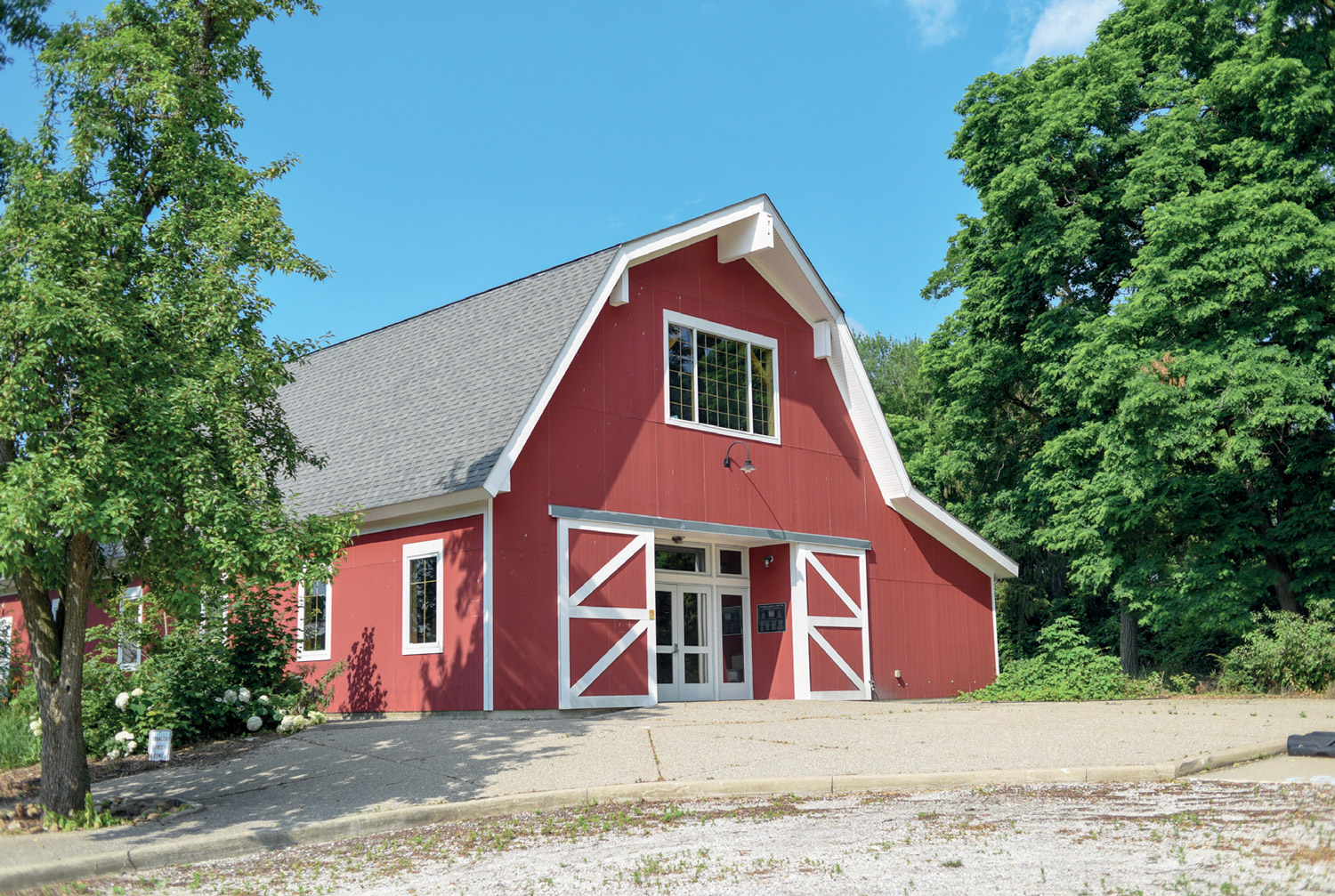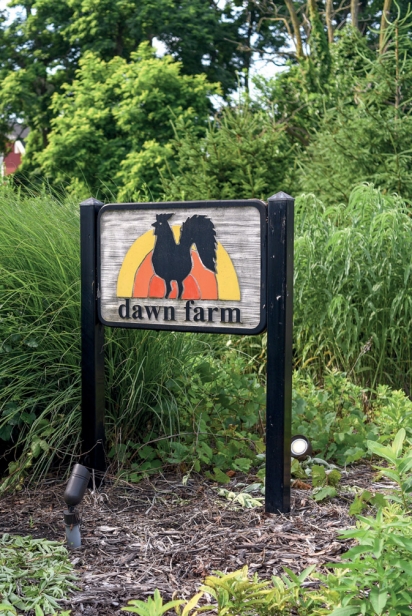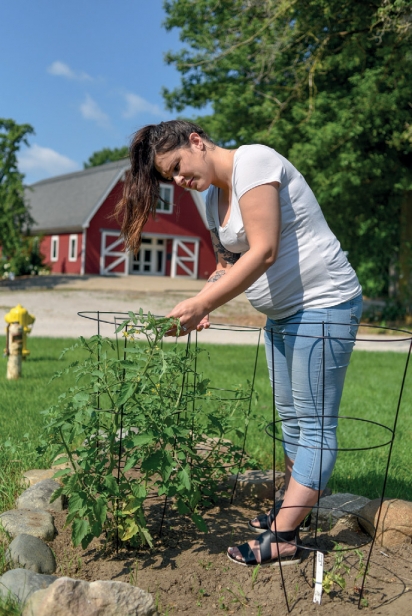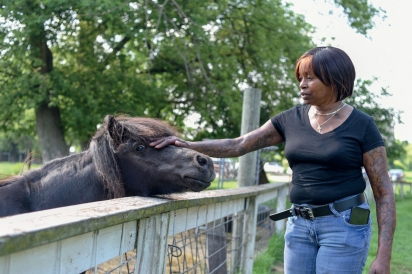High-Yield Healing
The Restorative Beauty of Dawn Farm
“I’d been in and out of treatment centers for the past two years. I was living in my car and didn’t have a place to go. I was trying to get a referral, and someone said, ‘Hey, look: Call this place in Ann Arbor…’” —Ross Zini
“I was what they call a ‘high-bottom drunk,’ which means ‘high-functioning but a mess on the inside.’ Coming from the restaurant industry, I wanted a residential place—but one where I could work, not a hospital situation. This place was really my only option.” —Jeremy Abbey
“I remember when I first got here, I said this out loud to people: ‘I can’t believe this place exists….’” —Tegan (where requested, this article omits last names to respect clients’ privacy)
Meet Ross, Jeremy and Tegan.
The common thread between them? Sobriety. More than three decades, cumulatively. And “this place”: Dawn Farm.
Founded in 1973 by three friends in recovery—Gary Archie, Jack Scholtus and Jim Balmer, each of whom has served at different times as the Farm’s CEO—with a straightforward goal: to provide a range of programs to help people struggling with addiction. The pillars of the approach: creativity, compassion and hope.
Archie’s inspiration had been his experience at a therapeutic community for addicts in Canada; he wanted to create something similar in Michigan. Its approach fostered community and work, and was grounded in a deeply held belief that any addict or alcoholic can get better.
For Olivia Vigiletti, the Farm’s communications director, that positive outlook—and outcome—is essential.
“I have always had addiction in my family and community,” she says, explaining. “When I first came here, I thought addiction was an impossible situation. That’s not the case. There’s a beautiful integration of cooperative work, community support and treatment by licensed therapists.”
Unfortunately, that doesn’t make detoxifying any easier.
“I was sick,” says Ross Zini, a program coordinator at Dawn Farm. “I went through heroin withdrawal, but even though I felt so bad, I still had to go to 12-step meetings a couple times a day. Honestly, I felt resentful. It seemed so unfair while I felt so bad.”
Jeremy Abbey agrees.
“Those first 14 days of detoxing—that’s the biggest obstacle facing you,” says Jeremy, who now serves as executive director of Soil2Service, and the director of Culinary Education at the Detroit Institute of Gastronomy, as well as publisher of edibleWOW. The dedicated culinary professional knows addiction firsthand.
But even from the very beginning of that difficult process, Dawn Farm’s holistic approach starts to work its unique magic.
“You start to see what a schedule can do for your life,” says Jeremy: “cleaning a toilet, waking up to feed the animals, tending to the goats and llamas.”
He continues: “You’re doing what are basically menial tasks, and you’re thinking, ‘this sucks.’ But over multiple days of doing it, you have so many moments to reflect on yourself.”
The Farm experience is based on voluntary commitment.
“People come in of their own volition,” says Olivia. “Any person can call and set up a screening to see if they’re a good fit. If we’re not the best place, we’ll help find the place that is. We don’t take people against their will. We’ll give you expectations up front.”
Programs are customized to best serve each person. Some clients live at the 64-acre farm, located near the border of Ann Arbor and Ypsilanti. Others opt to live at Dawn Farm Downtown, a house located in Ann Arbor, near Kerrytown. Clients can choose to move on to one of the Farm’s transitional houses, for anywhere from six months to two years.
Open minds and hearts are powerful strands of the Farm’s DNA.
“They accepted me as I was, and gave me that little nudge to meet people in the community,” says Tara, a member of the Dawn Farm intake team. “They did a lot of things for me I couldn’t have done for myself at that point.
Given the isolation inherent to addiction, that little nudge can feel like a shove. Jeremy initially resisted—strongly—a suggestion that he use his restaurant experience in the Dawn Farm kitchen.
“I was afraid the whole environment would trigger me,” he admits. But then he realized he could “help people out. I ended up with some fairly innovative methods with donated food, government food.”
Most revelatory for him: “I really discovered the power of putting my hands in dirt, that connection of caring for something, and then it gives back. You take care of this chicken and you receive something as simple as an egg. It’s life-changing.”
And that is the magic of Dawn Farm.
“We have a joke around here,” says Olivia. “We’re terrible farmers. For 64 acres, we just don’t produce that much.”
But high-volume crop yield is not, and has never been, the point of Dawn Farm.
“The act of working together for that small amount of produce is so special. It’s this concept of a cooperative environment, how it can help to remove barriers that have made people’s lives difficult,” she says.
And if, for any reason, a client doesn’t complete their program, they will get another chance—or more. “We always say, ‘Our door is stuck open,’” says Olivia.
Ross’ experience proves the statement. “My first time, I only did a five-day detox,” he says. “It planted a seed for when I was a little more ready to do something a little more ambitious.”
He admits that, early on, “I did what we call ‘chipping,’ using here and there. And I was faking drug tests, lying all the time. It was horrible, leading a double life. It takes a lot of emotional energy.”
Referred elsewhere with what he terms “a more robust plan since I just couldn’t stop using,” he returned to the Farm’s transitional housing program. This time, he ended up becoming a Farm employee, and will begin earning his master’s in social work at Eastern Michigan University in the months to come.
As Ross and Tara illustrate, it’s not unusual for Dawn Farm to be a gateway for those who want to continue working directly with the recovery community. Jeremy, who returned to life outside the farm, profoundly examined how things would be different.
“You’ve got to change everything,” he says. “For me, that meant my environment, my friends, my outlook. There’s a thing in the [restaurant] industry, the end-of-shift drink. And I’m a musician, too, and it’s the same thing there. I just realized I didn’t need to celebrate in that way.”
About 10 years after he completed the program at Dawn Farm, Jeremy began pursuing a degree in sustainable agriculture. He says he found himself constantly thinking back to the Farm and how it changed his life.
“I found studies that suggested a relationship between the positive impacts soil and nature have on mental health and overall immunity,” says Jeremy. “As populations moved from rural environments into more urban settings, stress-related mental health cases and depleted immune systems followed the same trajectory. I think the success of Dawn Farm hints that there may be a correlation between digging in the dirt and a positive mental outlook.”
His Farm experience helped him find new ways to work with food too: in production, in education and in this magazine. Upon leaving Dawn Farm, Jeremy began working in food retail for a large national business to stay close to culinary, but away from the temptations and stressors of the restaurant environment.
“Here’s how I celebrated my second year sober,” he says: “I opened my first retail store for them.”
That was 14 years ago.
Dawn Farm: 6633 Stony Creek Road, Ypsilanti; dawnfarm.org
If you or a loved one is struggling with addiction, please don’t hesitate to reach out to Dawn Farm’s intake team at 734-669-8265.
DAWN FARM ANNIVERSARY JAMBOREE
Dawn Farm’s annual Jamboree fundraiser, Sun., Sept. 12, promises to be extra celebratory this year, given that last year’s had to be entirely online. The event features live and silent auctions, a pumpkin patch, mums for sale, children’s activities, farm animals, a hayride, live music, yummy food and all sorts of old-fashioned fun.
The Jamboree is a special time for Dawn Farm clients.
“We don’t host graduation ceremonies for our programs because there are so many pathways to success in recovery. Some of our own staff members never technically completed treatment,” says Olivia Vigiletti, communications director for The Farm. “But the Jamboree feels like a homecoming, with tons of past clients and their families in attendance every year.”
And while the Jamboree is a perfect time to support the Farm with a donation or purchase, “you don’t have to spend a dime,” she adds.








